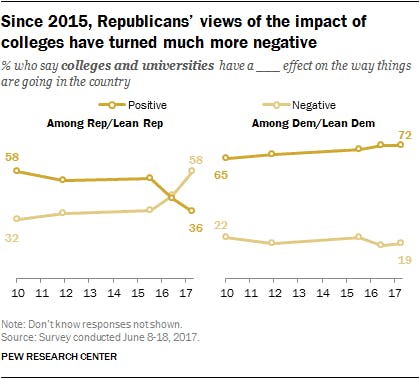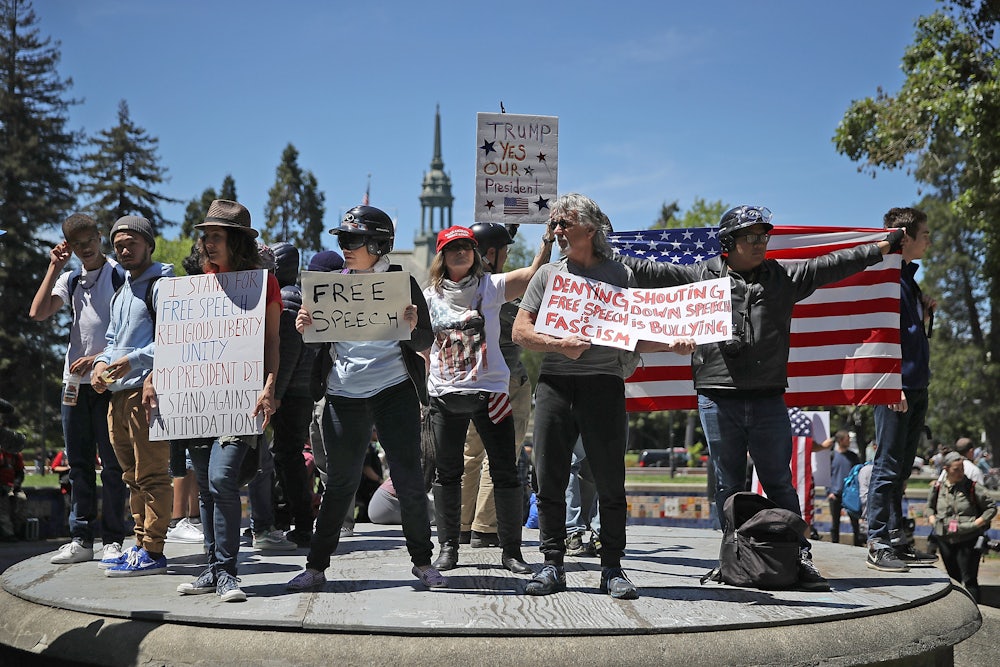More than a decade ago, Matthew Woessner and his wife April Kelly-Woessner made a bet. Woessner, a conservative political scientist at Penn State, thought liberal professors were indoctrinating their students. “I assumed that the typical student’s politics would be influenced by his or her academic mentors,” Woessner wrote in Academe, the magazine of the American Association of University Professors, in 2012. “While I was not strongly influenced by my professors’ left-wing politics, I assumed most conservative students weren’t so resilient.” But Kelly-Woessner, an Elizabethtown College political scientist who describes herself as moderate, didn’t buy it. She was convinced that most undergraduates were set in their political views, even by age 18. “Students aren’t sponges,” she used to tell her husband. Ultimately, the pair decided to resolve their disagreement in the most academic way possible: by conducting a study.
Kelly-Woessner won the bet.
“There is no evidence that an instructor’s views instigate political change among students,” they wrote in their 2009 study of nearly 7,000 students at 38 institutions, which was published in PS: Political Science and Politics, the journal of the American Political Science Association.

Despite leaning more to the right than most academics, the couple believes colleges and universities have a largely positive effect on the nation. That puts them at odds with the majority of conservative Americans. A Pew Research poll released this week found that 58 percent of Republicans and GOP-leaning independents believe higher education has “a negative effect on the way things are going in the country,” versus just 19 percent of those on the left who say the same. While opinion on the left has remained fairly steady, on the right it has become decidedly more pessimistic over the past two years (in the accompanying graph, note the drastic shift after the poll taken in September 2015).
As for why higher education’s reputation is plummeting on the right, there’s a stark divergence of opinion that, in a way, mirrors the partisan divide in the poll itself.
On the left, Salon’s Sophia Tesfaye asked if America had “hit peak anti-intellectualism.” New York Times columnist Paul Krugman argued that “what was already a strong strain of anti-intellectualism has become completely dominant” in the Republican Party: “The notion that there was a golden age of conservative intellectuals is basically a myth. But there used to be at least some pretense of taking facts and hard thinking seriously. Now anyone pointing out awkward facts—immigrants haven’t brought a reign of terror, coal jobs can’t be brought back, Trump lost the popular vote—is the enemy. In fact, I’d argue that anti-intellectualism was, in its own way, as big a factor in the election as racism.”
On the right, pundits saw the Pew results as comeuppance for colleges and universities, which, they allege, coddle leftists with trigger warnings and safe spaces while allowing the violent suppression of conservative speech. Bloomberg View’s Megan McArdle argued that in the last few years “colleges have readily supplied conservatives with images of an institution that is not merely left-leaning, but actively hostile to conservatives, as conservative speech on campus has increasingly been threatened. It started with students pressing for speakers to be disinvited from graduation speeches—sometimes liberals, but often conservatives. Then angry minorities were allowed to shut down conservative speeches with increasingly raucous protests that eventually turned to violence. And when violence occurred, schools seemed noticeably uninterested in identifying or punishing the people who committed it.”
“[The fall of 2015] was the season, recall, that Yale devolved into a riotous mess over whether students should be subjected to the psychic pain of culturally appropriative Halloween costumes,” The Weekly Standard’s Alice Lloyd wrote. “Concurrent protests at the University of Missouri, where the president and chancellor resigned in disgrace for their failure to correct symptoms of ‘systematic injustice’—and a professor was fired after threatening a student journalist—proved campus hysterics were not an ivory tower exclusive.”
And yet, it is exactly this kind of right-wing portrayal of college campuses that helps drive negative public opinion. As Paul Fain at Inside Higher Ed observed, “Virtually every day Fox News, Breitbart and other conservative outlets run critical articles about free speech disputes on college campuses, typically with coverage focused on the perceived liberal orthodoxy and political correctness in higher education.” The Washington Post’s Philip Bump noted the conservative media’s obsession over “safe spaces” on campus. “This idea quickly spread into a broader critique of left-wing culture,” Bump wrote, “but anecdotal examples from individual universities, such as objections to scheduled speakers and warnings in classrooms, became a focal point.”
Concerns about free-speech suppression on campus shouldn’t be dismissed out of hand, and liberals should speak out against any excesses within their ranks at colleges and universities. Yet the conservative media’s incessant coverage of these controversies undoubtedly inflates their significance, suggesting a systemic problem in higher education that doesn’t exist. But the belief that it exists, though largely confined to the right, has consequences for us all.
The conservative narrative about colleges and universities has several common complaints: They’re inhospitable to conservatives. Liberal professors indoctrinate their students. And left-wing students have become snowflakes—but also militant “social justice warriors.” In every instance, the evidence against these claims is stronger than the evidence for them.
On the question of liberal professors indoctrinating their students, the consensus is clear. “Yes, professors lean left (although with some caveats),” Inside Higher Ed’s Scott Jaschik wrote in February. “But much of the research says conservative students and faculty members are not only surviving but thriving in academe—free of indoctrination if not the periodic frustrations. Further, the research casts doubt on the idea that the ideological tilt of faculty members is because of discrimination. Notably, some of this research has been produced by conservative scholars.”
One such example is last year’s Passing on the Right: Conservative Professors in the Progressive University, written by Jon Shields, a government professor at Claremont McKenna College, and Joshua Dunn, a political science professor at the University of Colorado. “As two conservative professors,” they wrote in The Washington Post, “we agree that right-wing faculty members and ideas are not always treated fairly on college campuses. But we also know that right-wing hand-wringing about higher education is overblown.”
Dunn told me he thinks conservative students do face social pressure from their liberal peers. “For your average conservative student going about their daily life,” he said, “my guess is that politics isn’t going to come up that often for them, if only because they often choose majors in the hard sciences or in business.” He argued the issue is much more salient for sociology or political science majors. At the same time, he cautioned, “One thing I think happens is that conservative students go into college expecting the worst. It’s just not a healthy attitude in general.”
Dunn hopes that schools will take this opportunity to promote intellectual diversity and civil discourse, and that campus conservatives, instead of inviting right-wing provocateurs like Milo Yiannopoulos, will bring in more speakers like Princetown professor Robert George, who has joined with Cornel West in promoting healthy debate. “I do think that conservative media could help. Of course, it’s not terribly newsworthy if a speaker comes to campus, gives a talk, people ask pointed but polite questions, and then everyone goes home without a YouTube-worthy video being captured,” he told me. “People smashing windows makes for better television than an egghead in a frumpy suit giving a talk. But they could do things that highlight how individuals that strongly disagree with one another can nevertheless work to promote civil discourse and even friendship across ideological lines.”
Woessner worries about a lack of ideological diversity among faculty, and he is troubled by what he sees as attempts to suppress speakers with alternative points of view. “It borders on fascism when we try to use physical threats or attempt to disrupt people from having a conservation that may be unpopular,” he said. And yet, he stresses that “part of succeeding in higher education is not having a victim mentality,” and the right shouldn’t create a “self-fulfilling prophecy” about being discriminated against on campus. “The more conservatives overplay the narrative that they’re being persecuted and oppressed, the more they will check out of higher education, and that makes the imbalance worse,” he said. “I think conservatives have more to gain from higher education than liberals do. Liberals don’t have their ideas challenged as often, and that makes it harder for them to grow intellectually.”
Kelly-Woessner says liberals need to make changes, too. She said her research shows this generation of young people is more politically intolerant than previous cohorts. “At the same time,” she said, “it’s a few instances that get blown up and then represent what colleges and universities look like.” She notes that campuses don’t get media coverage when host conservative speakers without controversy. “We don’t have the same visceral reaction to conservatives on campus,” she said of Elizabethtown. “In fact, we’ve had quite a few on campus, and nothing ever happened.... Of course we’re going to have slanted perspective on the magnitude of the problem, because nobody reports on the dog that doesn’t bark.”
The conservative media has painted a distorted portrait of academia, and their customers apparently are adjusting their opinions accordingly. But even if the decline in Republicans’ regard for higher education is largely attributable to right-wing hysteria and hyperbole, liberals can’t afford to ignore it. The Pew poll has serious implications, for instance, for the funding and independence of public colleges and universities, which is increasingly under attack by Republicans. Consider Wisconsin Governor Scott Walker and North Carolina Governor Pat McCrory’s respective wars on public education in their states. Low public opinion of colleges and universities will only embolden more Republican governors to do the same—and to provide them cover when they do.
The GOP’s newfound negativity about academia, Woessner told me, “erodes the public support of higher education in state legislatures. If conservatives have a false impression of the state of higher education, and they believe in the open persecution of conservatives, there will be less support for the public financing of higher education.” That hurts professors and students of all political stripes.
